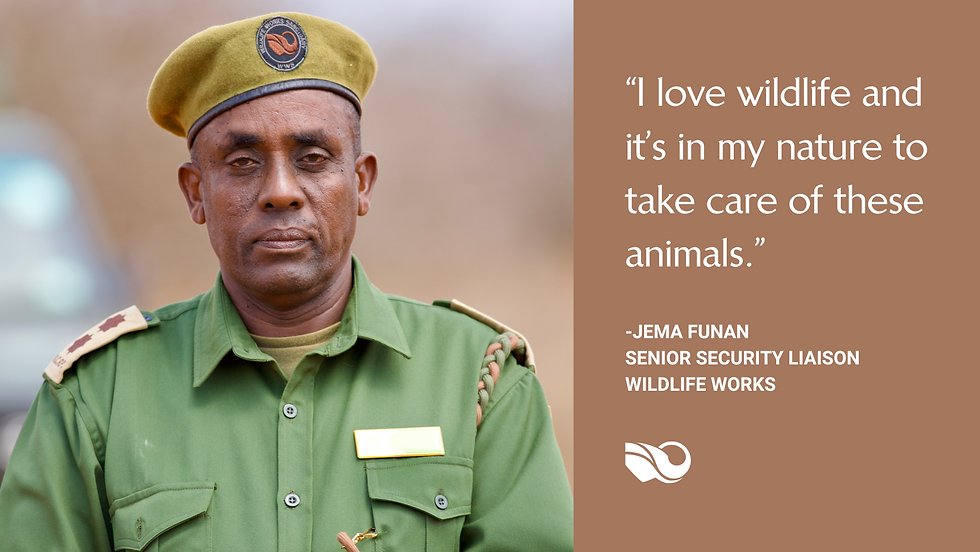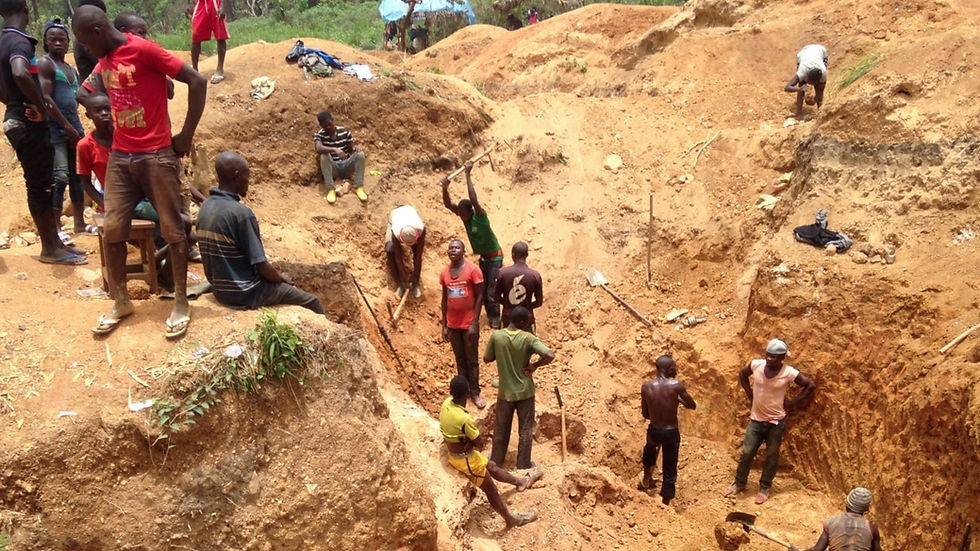World Elephant Day: A Ranger’s Story on the Frontlines of Protecting Elephants at the Kasigau Corridor REDD+ Project
- Aug 11, 2025
- 6 min read

This World Elephant Day, we’re spotlighting the courage of Jema Funan, Senior Security Liaison at the Kasigau Corridor REDD+ Project. With 26 years on the frontlines of wildlife protection, Jema has sacrificed his personal safety to protect elephants.
Jema Funan, a veteran ranger at the Kasigau Corridor REDD+ Project, can still picture himself and other rangers attacked with machetes by poachers back in 2010, when wildlife poaching in Kenya was at its height. Another vivid memory was in 1999, when he and other rangers were held hostage for about four hours by a group of shiftas (bandits/elephant poachers), and how they thought that moment would be their last.
Jema Funan, Senior Security Liaison at Wildlife Works has spent the last 26 years patrolling and watching over the project area. He carries an unwavering respect for the wild and an even greater responsibility to protect it. He has seen both the beauty and brutality that comes with protecting nature. Though reserved, his words hold deep memories of the forest he protects, and he remembers every chapter.
“We were stationed at Kisima dam, on Taita Ranch, with four other rangers. At around 7 in the morning, I was brushing my teeth while the other rangers were inside the camp. I saw a group of 4 men whom I suspected to be poachers judging from their attires, a turban covering their heads, combat styled jackets and some padded sandals often worn by poachers to conceal their footprints,” he recalls.
One of the men, visibly older, was carrying a firearm and seemed to be the leader in the group, commanded Jema and his team to sit down “They began interrogating us, demanding to know what we were doing there and why we are all in uniform,” he recalls. Jema knew that revealing their identity would be the end of them, so he played it cool and calmly said they were herders looking after cattle. Also lucky for them, one ranger had swiftly concealed his hand-held radio.
One of the poachers looked straight into Jema’s eyes and accused him of lying. “Why do you look like a law enforcement officer?” he asked. “Your eyes look like that of an askari (law enforcement officer),” he added. “No, I am not an askari, " he pleaded with them.
The men sounded like they had been keeping track of the rangers for some time because they demanded to know why a car was coming to their camp every day. Jema responded that the car was just coming to deliver water and food.
The poachers then demanded they all get inside the camp and ordered the rangers make them some tea. They took tea as Jema and his team watched in fear not knowing what their next moment would be. “One of them reiterated that they wouldn’t hesitate to eliminate us if we got in their way,” he recalls. Hatuna haja na nyinyi, ukileta mdomo ndio tunakuua. (We don’t need you, but if you start talking, we’ll kill you).
After hours of tension and uncertainty, they were ordered to look away as the bandits wanted to leave without being spotted. “What are you looking at? Look away now,” one of them told us. After not hearing a sound for some time, they hoped that their nightmare was now over, but Jemma and his team wondered if this was a trap.
After checking everything outside to make sure no one was there, we requested for a backup. The following day, two teams cordoned off the area, tracking the poachers’ footprints for more than 50 kilometers, after which they disappeared.

One of the most tragic events for Jema happened on 13th January 2012.
During their usual patrols accompanied by 6 other rangers, a call had come from one of the carbon samplers at 7 am saying they heard something believed to be a gunshot at Salama, one of the project zones on Rukinga Ranch. Jema and the Kasigau Corridor ranger team, accompanied by two Kenya Wildlife Service Officers, went to confirm. “Among the rangers was Abdullahi Mohammed, often referred to as ‘GPS’ because of his vast knowledge of every area in the project zone, as well as being an excellent tracker,” recalls Jema.
By the time the team arrived at around 10am, they could see footprints which appeared to be of fleeing elephants. “When we moved closer, we could see blood and a badly wounded elephant running away from a herd,” he says. “We also saw a suspicious human footprint and decided to follow the trail. At some point the elephant disappeared into the thick bush and they could now clearly see a suspected poacher’s footprints,” he adds.
The sight of the wounded elephant ignited a fury in all of them and they were determined to find the person responsible. Without hesitation, they all decided to push forward, tracking the poacher’s escape route until around 3 pm to a place on Taita ranch. The footprints then disappeared. Judging by the footprints, they knew the poachers couldn’t have gotten that far. At around 3.30pm, they decided to spread out and by 4.00 pm they picked up another footprint. The team started moving in single file with Jema leading, followed by Abdullahi (GPS), two Kenya Wildlife Service Rangers, and three other Kasigau Corridor based rangers.
As they were tracking, he immediately saw two people laying in the bush ahead of them and raised his hand to warn his colleagues. “I turned around for a split second and that’s when I fell. As I lay there with my face up, I tried to get up and couldn’t. I heard one of my colleagues say to not get up, as I had been hurt. I touched my body and all I could see was blood, and I was screaming in pain,” he said.
“Abdi quickly rushed to my aid, and we immediately heard a gunshot. ‘They got me,’ Abdi said. And he also fell.”
What followed was an exchange of gunfire between the poachers and the Kenya Wildlife Service officers, prompting the poachers to flee.
Jema and Abdullahi had both been shot and were in critical condition. The rest of the team immediately called for backup, and they were airlifted for urgent medical attention.
“While being wheeled to the hospital, I overheard someone say, ‘Let’s focus on him because he is still alive and the other one is gone.”That’s when it struck Jema that Abdullahi succumbed to his wounds.
His journey to recovery was a long and painful one, as he had multiple surgeries, including a replaced shoulder. It took two years for him to be back on his feet again.
Two years later after the incident, a poacher was apprehended in the project area with 61 rounds of ammunition. It was also a time when ivory smuggling and elephant poaching had reached its highest levels, with Kenya losing hundreds of elephants annually, numbers now known thanks to a report by the Convention on International Trade in Endangered Species of Wild Fauna and Flora (CITES). During this time, Jema recalls seeing a family of 6 elephants including a calf all killed at Dawida ranch, one of our project zones.
These experiences, he says, have given him courage to protect nature while still carrying the weight of loss. “I love wildlife and it’s in my nature to take care of them,” he says.
Last year, Jema was one of the four rangers who were selected by the Project Lead and the Interim Security Manager for management positions, aimed at improving efficiency, amid a push for better relations between the rangers, the landowners and the community. Jema was named as the Senior Security Liaison officer who would be working with the community in the Kasigau Corridor REDD+ Project to build relationships by speaking with community leaders about security related issues and to gather information directly relating to the bush meat and charcoal trades.
To Jema, this is an exciting position for him because he will get intelligence from the community about any illegal related activities happening or planning to happen and find a way to intercept it.
“I think about Abdullahi and that fateful day, and that has given me more courage to undertake my duties.”
For him, poachers don’t scare him because being a conservation ranger is more than just a job; it’s a calling.
*Context Corner:
At Wildlife Works, we recognize that the term "poacher" is often misunderstood and misused. Many poachers who have operated within our project areas are outsiders, coming from other regions to exploit wildlife for illegal commercial trade. However, it is critical to distinguish this from the subsistence hunting traditions of Indigenous and local communities, which are often rooted in deep cultural and ecological stewardship.
Historically, colonial systems criminalized local communities for hunting on their ancestral lands, while outsiders with resources were permitted to hunt legally. We are mindful of this history and do not vilify local people. Even poachers who come from outside communities enter the wildlife trade out of need. Instead, our work focuses on creating sustainable jobs to address the root causes of local poaching, and to support community-led conservation efforts. By co-creating alternative livelihoods, we help reduce the economic pressure that can push people towards poaching as a means of survival.
Conservation thrives when local communities are respected and have real economic opportunities beyond poaching.



